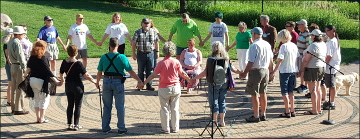This content has been archived. It may no longer be relevant
JUNE 21ST WAS SOLIDARITY DAY IN WISCONSIN
WISDOM, JONAH OF THE CHIPPEWA VALLEY, AND WESTERN WISCONSIN EXPO STANDS IN SOLIDARITY WITH WAUPUN PROTESTERS
On Tuesday, June 21st at 5:30pm in Phoenix Park, 20 citizens gathered along with other prisoner advocacy groups across Wisconsin to stand in solidarity with the men who have been refusing to accept food in protest of injustice in the use of Solitary Confinement is Wisconsin prisons.

At least 7 inmates in Wisconsin prisons, mostly at Waupun, are engaged in a “food refusal” action. Some of them have not eaten anything since June 5; others began June 10, and some have since ceased refusing food. As of June 23, some are being force fed by prison employees. Among their demands are that all prisoners who have been in solitary confinement for more than one year should be released back into the general prison population, and that there be proper mental health services for those who have been subjected to solitary confinement. We pray for their physical and psychological health as they take this action.
JONAH, with WISDOM recognizes the urgency of the issues these prisoners bring to us, and strongly supports their calls:
- That the state legislature place a cap on the use of all types of Solitary Confinement (whether it is called “Administrative Segregation” or any other name);
- That the Department of Corrections and the state legislature recognize the United Nations standard, which considers more than 15 days in Solitary Confinement to be torture;
- That there be an oversight board, independent of the Department of Corrections, to monitor the conditions and use of Solitary Confinement in Wisconsin;
- That there be an immediate transition to less restrictive housing for every person in Wisconsin who has been in Solitary Confinement for more than a year;
- That there be proper mental health facilities and treatment for all who have been subjected to Solitary Confinement.
What we encourage everyone to do:
- Contact your local legislators: go to http://maps.legis.wisconsin.gov/# to search your legislators. Ask them to inquire about the well-being of the prisoners, and about progress in dealing with the action of ending solitary confinement.
- Contact The WisconsinDepartment of Corrections:
Secretary Jon Litscher, WI DOC, 608-240-5000,
3099 E. Washington Ave, PO Box 7925,
Madison, WI 53707-7925
Ask him to meet with the inmates IMMEDIATELY and to take action toward ending solitary confinement. - Write post cards of encouragement and concern to those participating in the fast
Waupun Correctional Institution
PO Box 351
Waupun, WI 53963
1) LaRon McKinley #42642
2) Lamar Larry #293906
3) Cesar DeLeon #322800
4) Joshua Scolman #422508 *Two prisoners at other institutions:Shirell Watkins #359661
Green Bay Correctional Institution
PO Box 19033
Green Bay, WI 54307-9033Norman Green #228971
Columbia Correctional Institution
PO Box 950
Portage, WI 53901-0950Example of a message: I am aware of your food refusal action. Please know that many of us are praying for you and taking action. We stand in solidarity with you in your struggle to recognize the dignity of all people.
WISDOM strives to be a vehicle by which those who are marginalized and ignored can have a chance to be heard. This is a moment to live that out by standing in solidarity with these men, who have been tortured in our name.
Information from solitarywatch.com:
Solitary confinement is the practice of isolating people in closed cells for 22-24 hours a day, virtually free of human contact, for periods of time ranging from days to decades.
Solitary confinement cells generally measure from 6 x 9 to 8 x 10 feet. Some have bars, but more often they have solid metal doors. Meals generally come through slots in these doors, as do any communications with prison staff. Within these cells, people live lives of enforced idleness, denied the opportunity to work or attend prison programming, and sometimes banned from having televisions, radios, art supplies, and even reading materials in their cells.
Few prison systems use the term “solitary confinement,” instead referring to prison “segregation” or placement in “restrictive housing.” As this may be done for punitive, disciplinary or purportedly protective reasons, the names may vary. Whatever the terminology, the practice entails a deliberate effort to limit social contact for a determinate or indeterminate period of time.
Some systems make a distinction between various reasons for solitary confinement. “Disciplinary segregation” is time spent in solitary as punishment for violating prison rules, and usually lasts from several weeks to several years. “Administrative segregation” relies on a system of classification rather than actual behavior, and often constitutes a permanent placement, extending from years to decades. “Involuntary protective custody” is especially common among children held in adult prisons, LGBTQ individuals, and other at-risk prisoners who live in indefinite isolation despite having done nothing wrong.
In 2015, The Arthur Liman Public Interest Program at Yale Law School and the Association of State Correctional Administrators reported that 80,000 to 100,000 people in state prisons were held in restrictive housing in 2014. That estimate is an extrapolation of data obtained from 34 states, housing 73 percent of all prisoners, which found over 66,000 people in restrictive housing. This figure does not include local jails, juvenile, military and immigration facilities.
As of late April of this year, 116 Wisconsin prisoners were held in “administrative confinement”, some for over 25 years.
In October 2011, the UN’s chief torture investigator called on UN member nations to ban nearly all uses of solitary confinement in prisons, warning that is causes serious mental and physical harm and often amounts to torture.
